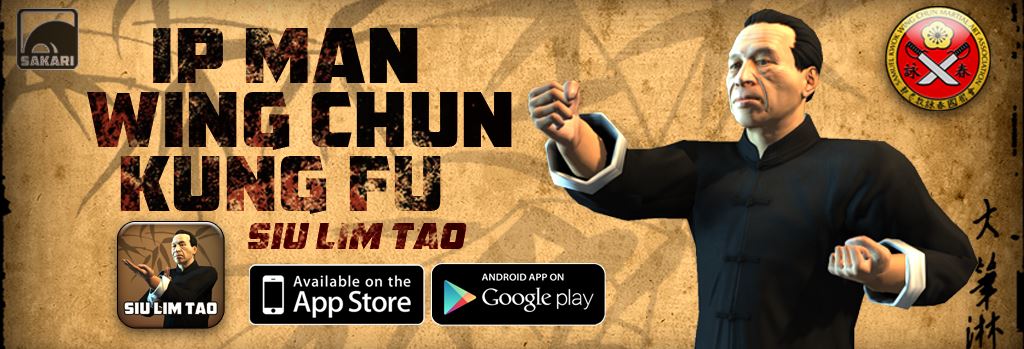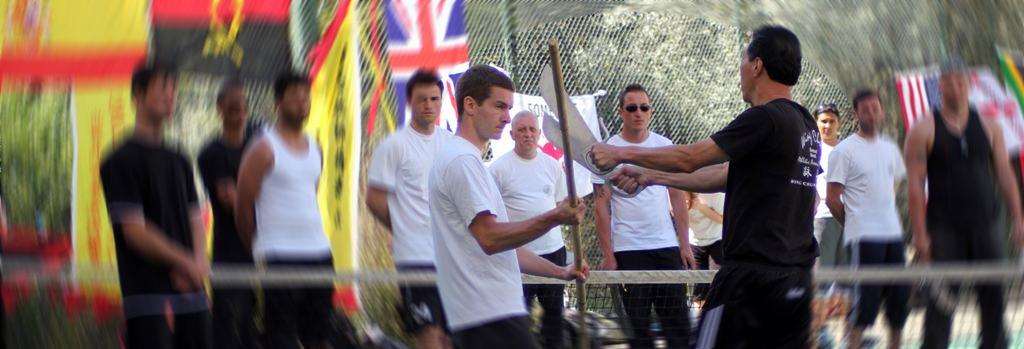Nutrition for Martial Arts Training
Article by Dan Knight added on 26 Aug 2012. Last updated on 8 Aug 2013.
Nutrition advice for Martial Arts & Wing Chun
Fighting food
There are literally thousands of books that have been written on nutrition. My Intention here is to cover the basics in relation to training Wing Chun and martial arts. Another motivation behind writing this was after reading the shockingly bad and dangerous nutritional advice found in the book "The Wing Chun Compendium (Vol 1)"[1]
Firstly you need to think about what you want to get out of Wing Chun. If you just want some basic self defence then it won't make much difference if you're not at the peak of physical fitness. Simply eating a balanced diet is good advice and will suffice for the average person. This is true unless you're over or underweight or get tiered easily or take a long time to heal and recover from injury if this is the case, or if you want to take your ability forward and help your body cope with increased training regimes it's important to take an interest in nutrition.
But before I start its worth mentioning that experienced athletes, medical professionals and scientists often disagree about what is right and wrong in terms of nutrition. However all is not lost, over the years a good amount of reliable information has been built up.
Your Nutrition Needs
You body needs carbohydrates, fats, fibre, 'minerals', protein, vitamins, and water along with some other things. I will look at these individually and then discuss the impact they have in relation to Wing Chun. Firstly the amount of different nutrients you need will depend on lots of factors including on your age, build and gender etc. Different authorities recommend different amounts, so I will only give some rough guides. When experimenting with your own body, be prepared to adjust your intake if you find you need to for some reason or another (loosing or gaining too much weight or lack of energy for instance).
Carbohydrates
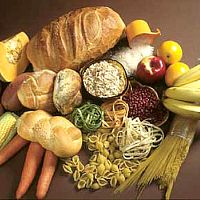
These come from foods like grains, pasta, potatoes, rice, bread, fruit and many other foods and should generally make up one of the largest portions of your diet. Carbohydrates are where a lot of you energy comes from, you can get by on just fat and protein but it's not recommended. There are generally two classifications of carbohydrates. Simple ones and complex ones.
Simple carbohydrates
Simple carbohydrates are generally single sugars. These don't provide long lasting energy as your body breaks down carbohydrates by 'knocking off' one sugar at a time and simple carbohydrates only have one or two sugars by definition so they get absorbed quickly. Fruit is a good source of simple carbohydrates; it's also loaded with other useful nutrients. Simple Carbohydrates are good to consume to regain energy quickly after training sessions. Simple carbohydrates also come from energy drinks and other sugary products.
Complex carbohydrates
Complex carbohydrates on the other hand are made up of longer chains of three or more of sugars and so take longer to break down giving a steady flow of energy. This is useful for anyone doing intense periods of Wing Chun training. I.e. if you have a sparing competition or expect to be doing Chi Sau for an hour or more you will find that complex Carbohydrates consumed in advance help keep your energy up. Pasta, Rice, Whole Grains, Potatoes and other starchy foods are a good source of complex carbohydrates.
Glycemic Index
It is not always obvious what is a simple or complex carbohydrate or exactly how long it will take to release the energy from food. Therefore the Glycemic Index is a good way to quickly identify the breakdown and release time of energy in certain foods, or 'How much and how quickly they raise blood sugar levels'. The scale goes from 0 -100. The lower the number the slower it releases energy and the higher the number the quicker. Pure sugar is 100 and things like peanuts are 14 (which is very low). A meal with a GI bellow 50 or 60 is good before a hard training session. A snack with a high GI of 70 or more is better after training to regain energy quickly.
Storing Carbohydrate
Your body can store Carbohydrates, this is one of the body's primary sources of energy. The human body generally stores around 2,000 carbohydrate calories (500 grams of carbohydrate) , but we can change this number through depletion and 'loading'. During depletion (from diet, exercise or a combination) we use up the stored carbohydrate. If we don't replenish these stores, we can run out of fuel for immediate exercise this can happen during heavy pad work sessions or extended periods of intense Chi Sau or sparring. In the same way, eating large amounts of carbohydrates can increase these stores. This is often referred to as carbohydrate loading. Our maximal carbohydrate storage is approximately 15 grams per kilogram of body weight. So a 79Kg athlete could store up to 1200 grams of carbohydrate [4,800 calories]; enough energy to fuel high intensity exercise for quite some time[2]. This would equate to many hours of intense exercise. In Wing Chun your unlikely to need this amount of energy so Carbohydrate loading (by eating lots of carbohydrates in the days and night before) is not likely to be needed. However for competitions or very intense training it may be worth considering carbohydrate loading.
Fats
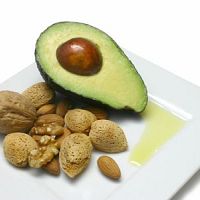
Let's start by saying fats[3] are not bad. In fact fat is needed to survive and certain types of fat can make a big difference to athletic performance (essential fatty acids). Most food contains some fat. Large natural sources of fat are found in things like coconut, avocado, olives, egg yolk, oil's and various types of meat. So what is the problem with fat? Your body can store an essentially unlimited amounts of fat , therefore if a person consumes too much fat their fat stores will grow and they will become overweight. Being overweight will slow down a person's ability to move in Wing Chun. Response and reaction times will be slower and intense exercise becomes much harder when overweight as the body is already under a lot of pressure and stress from having to support a person who is overweight. There are different types of dietary fat which are generally classified as saturated or unsaturated. Food often has a mix of both types.
Saturated fats
Saturated fats are commonly perceived as bad, however there is also a lot of research suggesting the opposite.[4] It is important to ensure your body gets at least some saturated and unsaturated fat. Saturated fats are typically solid at room temperature (such as butter or meat fat).
Unsaturated fats
Unsaturated fats may be further classified as monounsaturated (one double-bond) or polyunsaturated (many double-bonds). Unsaturated fats (except Trans Fats) are typically liquids at room temperature (such as oils like olive oil). Trans fats are a type of unsaturated fat , typically created in an industrial process called (partial) hydrogenation. Unlike other dietary fats, trans fats are not needed at all, and they do not promote good health.[5] Trans fats from partially hydrogenated oils are more harmful than naturally occurring oils. Polyunsaturated fats contain Essential Fatty Acids (see bellow section) and monounsaturated fats break down bad LDL (low density Lipoprotein) cholesterol and promote good HDL (high density lipoprotein) cholesterol.
How much fat do I need?
The table bellow is a common guide to what percentage of you body weight should be fat. This also translates to the rough percentage of your calorie intake that should be fat i.e. for most people recommend around 20% of your calorie intake to come from fat, this is about 50g of fat. There is 9 calories (kcal) per gram of fat. As with everything else there are no commonly agreed boundaries but the following acts as a good guide:
| Description | Women | Men |
| Essential fat | 10-12% | 2-5% |
| Lean | 14-20% | 6-13% |
| Healthy | 21-24% | 14-17% |
| Acceptable | 25-31% | 18-25% |
| Overweight | 32-41% | 26-37% |
If you go bellow your essential fat you risk you health and life. Fat is not just a back up source of fuel it's also used to store toxins your body can't deal with immediately and its needed to absorb Fat-soluble vitamins. It also provides many other useful functions. Fortunately it's very hard to remove all fat from your diet, but don't try too. If you are in the Essential fat range you need to eat more fat and put on more weight or you body and Wing Chun will suffer. At such low levels of fat you will lack energy and power and you will have very little weight to use meaning you will have to work much harder to produce the same power and as someone with just a little more weight.
If you are lean then you will likely have fast hand speed and fast kicking but you won't be on the verge of starvation. To be lean requires a very strict diet and missing meals can cause muscle wastage very quickly. Because a lean person has little back up reserves of fat when they run out of energy the body has no choice but to turn to the muscles as a source of energy and will actually break them down (for the Amino Acids in them) in order to survive. This is bad news for Wing Chun. So if you are lean your athletic performance will be good but make sure your food intake is well planned.
Healthy or acceptable are both normal amounts of fat. With this much fat most people will still have good speed with their hands and legs and will have enough fuel to train for extended periods and have weight behind their strikes.
Once in the overweight range your speed will start to reduce, however you will have more weight to put behind the punch. As the damage a punch does is based around the size of a fist and the weight behind it and the speed at which the fist moves, being overweight means you have less speed but more weight behind the strike so the damage you do will possibly remain the same (or just fall a little). However moving the body will be harder when overweight and training for extended amounts of time will also be harder.
Once you go past overweight into the obese category your Wing Chun may really start to suffer. Speed will become a real problem and movement will be slowed. Being obese will also make training for even short periods of time hard. However there is of course the underlying risk to you health that comes with being obese.
Essential Fatty Acids (EFA)
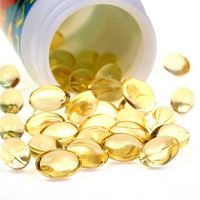 These are getting their own section despite being part of fats. Why? Because they are important! Good sources of essential fatty acids include fish (and fish oil), flax seed oils, soy beans, pumpkin seeds, sunflower seeds, and walnuts. Essential fatty Acids cannot be produced or synthesized by the body so must be included in the diet. These are Omega 3 and Omega 6. The body has a multitude of uses for these and should be included in the diet as they promote growth and repair and Energy production and diffusion of oxygen into the bloodstream and hemoglobin production and lower high blood cholesterol and triglyceride levels and stabilize insulin and blood sugar levels and they readily reduce lactic acid along with many other benefits.
In short they will make you body stronger and will allow your Wing Chun to improve at a quicker rate by helping your body deal with increased training. If you don't consume stuff with EFA's in its worth considering supplements. The difference it can make to your training and overall health can be quite great. And it will make your skin look healthier too.
Omega-3 fatty acid supplements should be used cautiously by people who bruise easily, have a bleeding disorder, or take blood-thinning medications, including warfarin (Coumadin) or clopidogrel (Plavix), because excessive amounts of omega-3 fatty acids may lead to bleeding.
These are getting their own section despite being part of fats. Why? Because they are important! Good sources of essential fatty acids include fish (and fish oil), flax seed oils, soy beans, pumpkin seeds, sunflower seeds, and walnuts. Essential fatty Acids cannot be produced or synthesized by the body so must be included in the diet. These are Omega 3 and Omega 6. The body has a multitude of uses for these and should be included in the diet as they promote growth and repair and Energy production and diffusion of oxygen into the bloodstream and hemoglobin production and lower high blood cholesterol and triglyceride levels and stabilize insulin and blood sugar levels and they readily reduce lactic acid along with many other benefits.
In short they will make you body stronger and will allow your Wing Chun to improve at a quicker rate by helping your body deal with increased training. If you don't consume stuff with EFA's in its worth considering supplements. The difference it can make to your training and overall health can be quite great. And it will make your skin look healthier too.
Omega-3 fatty acid supplements should be used cautiously by people who bruise easily, have a bleeding disorder, or take blood-thinning medications, including warfarin (Coumadin) or clopidogrel (Plavix), because excessive amounts of omega-3 fatty acids may lead to bleeding.
Protein
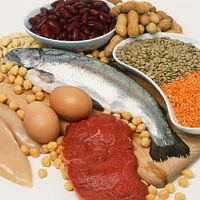
Protein is one of the main building blocks of life. High protein foods are meat (preferably lean), fish, Pumpkin Seeds, nuts, eggs, tofu, soy, and dairy products. It's very important to have a good intake of protein in order to repair and build muscles after training Wing Chun. Fortunately most food contains some protein and in developed countries protein deficiency has been all but eliminated. The average person needs to get around 60grams of protein a day (0.8g of protein per kg of healthy body weight). This is also fine for Wing Chun. However if you want to train hard everyday, protein will help your muscles recover, repair and grow faster. So having a greater protein intake if you're doing intense training will only be beneficial. Your body cannot store protein. It can convert it into fat but this is an energy intensive process and uses up around half of the calories in the protein. Your body can also only absorb around 20-30 grams of protein at one time (for use in growth and repair). So it is not recommended to take huge doses of protein at once. Lots of high protein food is also very high in fat, like nuts, seeds and meat. Therefore people who train hard and want a high protein and low fat diet should look to things like Tuna and Turkey, Chicken or protein shakes. Vegetarians and Vegans in particular should look at protein supplements to help them get enough to cope with increased training regimes. When using a protein shake remember your body cant really absorb more than 20 or 30g at once and it cant store[6] it so don't gulp down too much as it's a waste of money. The recommended scoops by many manufacturers are also much higher than needed. This may be because it does no harm to take more and you run out of your expensive protein powder sooner if you do meaning you have to go and buy another one from them.
Amino Acids
Protein contains Amino Acid, These make up a key part of the growth and repair of cells including DNA. Some Amino Acids are essential meaning they cannot be made by the so must be consumed as part of the diet. Eight amino acids are generally regarded as essential for humans . Four other Amino Acids are additionally required by infants and growing children. Some Amino acids are conditionally essential for some people. For instance those with phenylalanine sensitivity have to make sure they get tyrosine (which would otherwise be made from phenylalanine) to get all the Amino acids the body needs. Some sources of protein lack certain amino acids; therefore to keep your body responding to the pressure of training effectively a mixed source of proteins may help.
Branched Chain Amino Acids
Three of the essential Amino acids are called branched chain amino acids and make up 1/3rd of the skeletal muscle in the body so are very important of Wing Chun practitioners whose training will put the body under stress.
Fiber
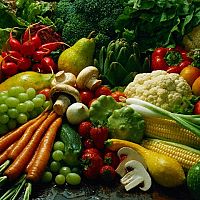
Fiber is found in fruit, vegetables, bean, seeds and grains. Fiber in general aids digestion and therefore helps the absorption of other nutrients. It can also make you feel full without adding many extra calories to your intake. There are two categories of fiber soluble and insoluble fiber. It is recommended that a person gets at least 30g of fiber a day. A lack of fiber will mean food takes longer to be processed by your body and the build up of food may make you slow when training Wing Chun.
Minerals
The term mineral generally refers to certain elements your body needs, like metals. Minerals are a micro nutrient I.e. your body needs tiny quantities of them. The essential minerals are generally considered to be Calcium, Copper, Iron, Magnesium, Manganese, Potassium, Phosphorus, Sodium, Selenium and Zinc. Its advised to the right amount of all of these for good health. However Calcium is worth a special mention in relation to Wing Chun as calcium is important for the repair of bones which may become damaged from heavy training including things like wall bag training and sparing. Milk is a great source of calcium. Make sure there is also a good amount of vitamin D in the diet as this is needed to absorb calcium.
Vitamins
Vitamins are another micro nutrient. There are 2 types of vitamin, fat soluble and water soluble. Humans need Vitamin A, B, C, D, E, K B1, B2, B3, B5, B6, B9, and B12. A balanced diet will normally provide the body with enough minerals to not need supplementation. These Vitamins perform a variety of functions which will promote good health (and good recovery for training) Vitamin D and B12 are often low (from dietary sources ) particularly in Vegetarians and Vegans, but are both important to someone who does Wing Chun . Cod liver oil and many breakfast cereals are fortified with Vitamin D. Vitamin B12 comes from animal products but is often added to breakfast cereal and processed drinks like milkshakes.
Like many things the human body can overdose on Vitamins particularly fat soluble vitamins like A and D. However huge quantities of these vitamins need to be ingested for extended periods of time for toxicity to occur. Many thousands of percent of your RDA for months usually. This usually only happens with people who take too many different supplements containing the same vitamin, although industrial accidents are also responsible for many cases of overdose. Overdosing can be serious and in extreme cases lead to death. Before taking any multi vitamins always read the label and check the dosage. Its hard to know how much of the multi vitamin will be absorbed (if any). But any vitamins with huge doses should be avoided. Cheap multi vitamins normally contain enough vitamins and will save you a lot of money if you do want to take multi vitamins. If taking multiple supplements always check you are not taking lots of doses of the same vitamin, particularly if its can cause toxicity (like A and D).
Water
Your body needs a good amount of water to prevent dehydration which would hinder your Wing Chun. Make sure you get at least 2 liters of water a day and always take extra water to training if you will be working hard. Any drink and some foods are a source of water. This included tea and coffee etc.
Footnotes
1. The brief pages in the book seemed to amount to little more than Vegan propaganda. Having contacted the author in relation to this issue I would go as far as to say the author knows nothing about nutrition for sports and the book should be recalled until the pages are changed as the advice (including the absolute lies) is bad at best, but if followed but an athlete (or someone who trained Wing Chun intensely) it could lead to serious harm to the body due to unstable blood sugar and a lack or protein (which the author doesn't seem to realise goes into making every cell in the body from DNA to muscle fibre). Furthermore The book makes out an out lies, like claiming spinach has 10 times more calcium than milk. A simple check on any internet nutrition site will show that spinach actually has less calcium (98mg per 100g as opposed to milk which is 113mg per 100g) and is also much less bio available. Of course spinach is great for the body in so many ways, but there is no need to lie. Being Vegan is an admirable life choice, however there is no grounds to recommend it for improving martial arts performance! This article aims to cater for people who are vegetarian or vegan but does not wrongly assert that it will help your health or performance in Wing Chun.
2. Many many hours, think in terms of marathons, or tour de France type feats.
3. Also sometimes called lipids.
4. Of artery clogs caused by fat only many studies have shown only 1/3 of the fat to be saturated the rest is unsaturated in the form of both mono and poly unsaturated fat. There are a plethora of medical and scientific studies linked from Wikipedia. More interesting articles can also be found on the Nutri Data Blog.
5. Food and nutrition board, institute of medicine of the national academies (2005). Dietary Reference Intakes for Energy, Carbohydrate, Fiber, Fat, Fatty Acids, Cholesterol, Protein, and Amino Acids (Macronutrients). National Academies Press. p. 423.
6. Extra protein is broken down into nitrogen and 'carbon skeletons'. The carbon skeletons are converted into fat and stored and the nitrogen is excreted from your body through urine.
Tags for this article:
NutritionMartial Arts Nutrition

